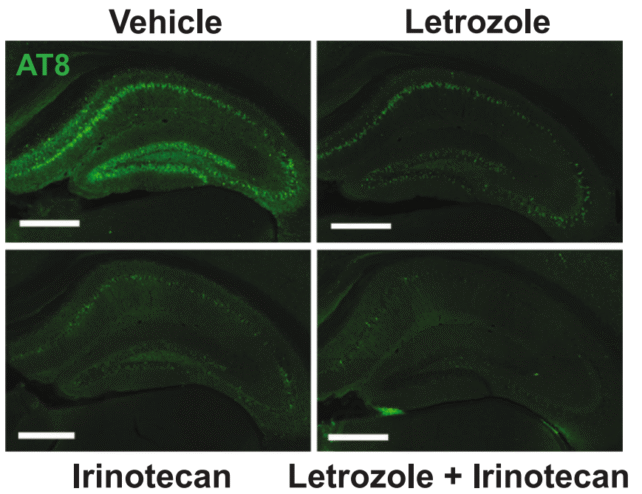In efforts to beat Alzheimer's disease, researchers are looking at existing drugs that could tackle the condition, and a new study identifies two promising candidates that are currently used to treat cancer.
Already approved by regulators in the US – meaning potential clinical trials for Alzheimer's could start sooner – the drugs are letrozole (usually used to treat breast cancer) and irinotecan (usually used to treat colon and lung cancer).
Researchers from the University of California, San Francisco (UCSF) and Gladstone Institutes started by looking at how Alzheimer's altered gene expression in the brain.
They then consulted a medical database called the Connectivity Map to look for drugs that reversed these gene expression changes, and cross-referenced records of patients who had taken these drugs as part of cancer treatments and their likelihood of developing Alzheimer's. Intriguingly, the drugs seemed to have reduced their risk.
Related: Mysterious Link Between Alzheimer's And Cancer May Finally Be Explained
"Alzheimer's disease comes with complex changes to the brain, which has made it tough to study and treat, but our computational tools opened up the possibility of tackling the complexity directly," says computational biologist Marina Sirota, from UCSF.
"We're excited that our computational approach led us to a potential combination therapy for Alzheimer's based on existing FDA-approved medications."

Having picked out letrozole and irinotecan as the best candidates, the researchers tested them in mouse models of Alzheimer's. When used in tandem, the drugs were shown to reverse some of the brain changes brought on by the disease.
The harmful clumps of tau protein that build up in brains affected by Alzheimer's were reduced significantly, and the mice showed improvements in learning and memory tasks – two brain capabilities often impaired by Alzheimer's.
By combining the two drugs together, the researchers were able to target different types of brain cells affected by the disease. Letorozole seemed to counter Alzheimer's in neurons, while irinotecan worked in glia.
"Alzheimer's is likely the result of numerous alterations in many genes and proteins that, together, disrupt brain health," says neuroscientist Yadong Huang, from UCSF and Gladstone.
"This makes it very challenging for drug development – which traditionally produces one drug for a single gene or protein that drives disease."
It's a promising start, but there's more work to be done: obviously the drugs have only been directly tested in mice so far, and these medications also come with side effects attached. They need to be reconsidered if the drugs are going to be repurposed for a different disease than what they were originally approved for.
One of the next steps should be clinical trials for people with Alzheimer's disease. According to the researchers, this approach could lead to more personalized and effective treatments, based on how gene expression has been altered in each case.
It's estimated that more than 55 million people have Alzheimer's today, and as the world's population ages, that's expected to more than double in the next 25 years. Finding ways to prevent the disease and even reverse symptoms would have a huge impact on global health.
"If completely independent data sources, such as single-cell expression data and clinical records, guide us to the same pathways and the same drugs, and then resolve Alzheimer's in a genetic model, then maybe we're on to something," says Sirota.
"We're hopeful this can be swiftly translated into a real solution for millions of patients with Alzheimer's."
The research has been published in Cell.
